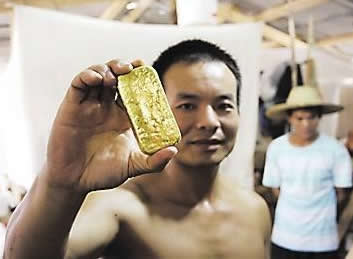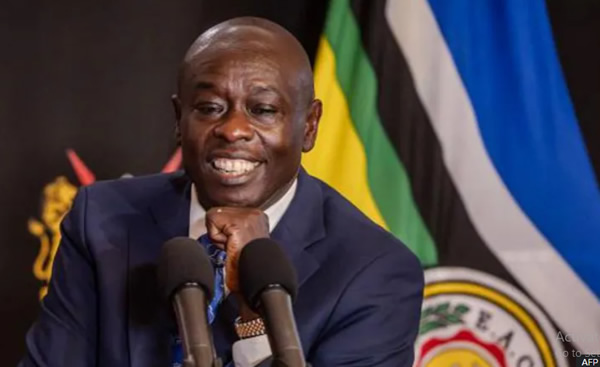
Photo: news.dnkb.com.cn
A modern day gold rush is taking place in Ghana, and fortune seekers from one particular Chinese county are making millions, according to 21cbh.
Shanglin County is located in China’s Guangxi Province and most of the county’s population, much like the rest of the province, is ethnically Zhuang, the largest minority in China.
For the last eight years, the people of Shanglin, nicknamed the “Shanglin Gang,” have found a new business venture: gold mining in Ghana. Now, this small West African country is home to as many as 50,000 Shanglin locals, and nearly all of the small and mid-size gold mines in Ghana are owned by them.
“Wherever there are restaurants, there are Chinese; wherever there is gold, there will be people from Shanglin,” Tan Xinhua, who owns a gold mine in Ghana, said, according to 21cbh, a Chinese financial news website.
Shanglin, which has a history of gold mining, sent more than 10,000 of its farmers to China’s northeast in the 1990s, to seek gold.
In 2005, there was talk of a man from Shanglin who took five million yuan ($813,535) to Ghana and turned it into 100 million yuan ($16.27 million) in three years. As the story spread, hordes of people rushed to Ghana, the second largest gold producer on the continent after South Africa.
Large mines in Ghana, which extract gold from rock, are owned by corporations such as Newmont Mining Corp., Gold Fields and AngloGold Ashanti. River gold, on the other hand, cannot effectively be mined by the large equipment typically used by these companies.
The immigrants from Shanglin have stepped in to fill this gap and concentrate their businesses in the cities of Kumasi, Obuasi and Takoradi, where there are many smaller mines. Since then, the Shanglin Gang has all but monopolized these mines with the help of a closely guarded sand-pumping technique, which is said to help mine river gold.
Ghana’s laws specify that areas smaller than 25 acres can only be mined by Ghanaians but that has not stopped the Shanglin Gang.
“As long as you enter into an agreement with Ghanaian landowners, you can mine,” Tan said. “It’s their land and their mining permit. I’m just helping him mine.”
“Those already in Ghana will always bring their friends and family out too,” added Tan, who bought his 25-acre mine with 25,000 Ghana cedis ($12,511) and has more than 30 relatives and friends working the mines.
Ghanaian landowners usually receive 10 to 12 percent of the “stock rights” to the mine. At the end of each day, the landowner will collect what they are entitled to. In other cases, the landowner is paid a monthly flat rate, usually 10,000 Ghana cedis ($5004).
Tan, who has hired five people from Shanglin and two locals, plans to make at least 10 million yuan ($1.63 million) in three years. This apparently is not an empty dream — someone he knows bought a mansion and a Ferrari in China recently.
The Ghanaians are paid 12 cedis ($2) a day, which is two to three times more than what they would earn otherwise. Shanglin workers are paid 6,000 yuan ($976) per month, plus two to three percent of the gold produced each day.
“Even if you are working for others, you would make 300,000 yuan ($48,812) in three years,” Tan said.
According to data published by the Ghana Chamber of Mines, the country produced 3.6 million ounces of gold in 2011. Su Zhenyu, the secretary general of the Chinese Mining Association in Ghana estimated that about 40 percent is produced by small mines owned by the Shanglin Gang.
There are more than 1,000 gold productions owned by Shanglin’s people in Ghana. Each production has on average two machines, producing 200 to 300 grams of gold daily. Some get lucky and produce up to one kilogram a day, some only 30 to 50 grams, while others produce nothing.
If a mine produces 300 grams a day, at 280 yuan per gram, a mine will have made 100,000 yuan ($16,270) in one day. Even after production costs are accounted for, a mine owner could still make more than 10,000 yuan ($1,627) a day. That works out to 10 million yuan ($1.63 million) in one year.
Criminals have been targeting the Shanglin Gang for their increasing wealth. In March, a man from Shanglin was robbed and shot 27 times with an AK-47.
“In 2011, our mine in Kumasi was looted twice,” Li Zengquan, a Shanglin miner said. A shootout took place during the day, and both Chinese and Ghanaians were killed.
“Living in a foreign country, the most important thing is staying alive, money is secondary,” another Shanglin miner, Hu Hongshi, said. His mine usually keeps 200 grams of gold on hand.
“If 20 or 30 bandits came, there is no way we can go up against that many guns. We ask them to take that gold, and let us live.”
Shootings between Shanglin miners and bandits are commonplace, 21cbh reports. To stay safe, three to four mining teams live together and sell their gold together. Most Shanglin teams possess firearms, which have become steadily expensive as demand increases.
The Shanglin Gang, most of whom are in the country illegally, are wary of the police and fearful of being caught by immigration officials.
“Before, when immigration officers came by, they would leave for a few hundred cedis,” Tan said. “But now they might put you in jail, and ask for exorbitant bails, or you get sent back to China.”
Another enemy of the Shanglin Gang is malaria. Most mines are located in hard-to-access areas, which means miners can contract malaria and die before they can be taken to a hospital.
Even with these risks, most Shanglin people consider it a good business venture.
“50 to 60 percent of the Shanglin people here make money,” Hu said.
To cater to the newly rich Shanglin businessmen, Chinatowns full of restaurants, hotels, karaoke bars, supermarkets and hospitals have sprung up all over Ghana.
This has kickstarted a parallel industry as Chinese farmers have moved to Ghana to grow produce for the Shanglin expats. Prostitutes have made the journey hoping to cash in on the boom as they can earn twice or three times as much as their counterparts in China. And, casinos have been built to serve the gambling habits of the Shanglin Gang.
But, Tan says he would never go to a casino. His goal is to accumulate 10 million yuan and build a big house for his family.
And, after that?
“I want to marry a beautiful woman and open a teahouse. Maybe I can tell stories of my Ghana days to my customers,” Tan said, according to 21cbh.
Source: International Business Times








